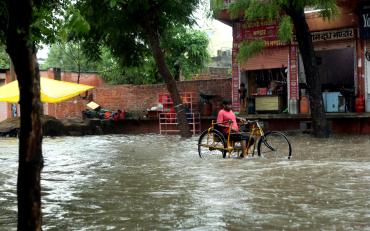Recent Research Demonstrates This
Bonn, Germany – Today, the Disability Inclusive Climate Action Research Program at McGill University and the International Disability Alliance (IDA) released a new report on Disability Inclusion in National Climate Commitments and Policies. Amid negotiations at the Bonn Climate Change Conference and a few days before the start of the 15th session of the Conference of State Parties to the United Nations Convention on the Rights of Persons with Disabilities (UNCRPD), this report demonstrates that governments are far from complying with their duties to pursue disability-inclusive climate action.
The report provides a systematic analysis of the inclusion of persons with disabilities and their rights in the climate policies adopted by State Parties to the United Nations Framework Convention on Climate Change (UNFCCC). This includes the Nationally Determined Contributions (NDCs) and Intended Nationally Determined Contributions (INDCs) that States are required to submit every five years, as well as their national climate adaptation and mitigation policies. The report also features a compendium of references to disability in these climate policies.
States are obliged, under international human rights law – most notably under the UNCRPD – to respect, protect, and fulfil the rights of persons with disabilities in their response to climate change. International bodies, including the United Nations Human Rights Council, the Committee on the Rights of Persons with Disabilities, and the Office of the High Commissioner for Human Rights, have recognized the need for States to pursue disability-inclusive climate action. Yet, the report indicates that most governments around the world are failing to do so.
The report finds that only 35 of the 192 States Parties to Paris Agreement refer to persons with disabilities in their NDCs or INDCs. At the domestic level, only 45 States refer to persons with disabilities in their climate adaptation policies, and none appear to refer to persons with disabilities in their climate mitigation policies. Moreover, the report concludes that even when States refer to disability, they do so in a cursory manner, without including meaningful mechanisms to consult people with disabilities or ensure their rights are respected in climate policies.
“States are not fulfilling their obligations under the UNCRPD in the context of the climate crisis,” explains Sébastien Jodoin, a law professor and director of the Disability Inclusive Climate Action Research Program, who co-authored the report.
“A disability-inclusive approach to climate governance recognizes and protects the substantive and procedural rights of persons with disabilities in the development and implementation of climate policies, but most States fail to mention persons with disabilities in their climate policies at all. Where they do include persons with disabilities, it is usually to indicate their vulnerability to climate change or to signal the need for their inclusion, without providing concrete measures to promote their resilience and/or to involve them in efforts to transition to low-carbon societies. The failure to consider persons with disabilities or their rights in climate policies only reinforces social inequalities and undermines their effectiveness.”
The consequences of failing to adopt a disability-inclusive approach to climate action are significant.
“States are exposing persons with disabilities to great risks,” says Elham Youssefian, Inclusive Humanitarian Action and Disaster Risk Reduction Advisor at the International Disability Alliance.
“Climate change has a disproportionate impact on persons with disabilities, but this is not inevitable. It is the result of the systematic failure of States to engage with persons with disabilities and integrate their rights when designing adaptation responses. Moreover, without prior consideration of rights and requirements of persons with disabilities, even well-intentioned policies to reduce carbon emissions can lead to violation of disability rights. For example, enhancing fossil fuel prices to encourage using public transportation without considering the fact that most public transportation systems are not accessible to people with physical or visual impairments, would be discriminatory and in violation of their freedom of movement and right to live in the community. On a more general level, the failure to include people with disabilities in climate action means that the world is deprived of potential contributions of the disability community in saving our planet.”
The report concludes by calling on States to live up to their obligations under international human rights law and take concrete steps to ensure that persons with disabilities and their rights are fully and effectively included in collective efforts to combat climate change.
Click here to access the report in English, French and Spanish.
For additional commentary on the report’s key findings and recommendations, contact:
Elham Youssefian
Inclusive Humanitarian Action and Disaster Risk Reduction Advisor
International Disability Alliance
eyoussefian [at] ida-secretariat.org
For additional information on the report, its methodology, and findings, contact:
Sébastien Jodoin
Associate Professor & Canada Research Chair in Human Rights, Health, and the Environment
McGill University, Faculty of Law
sebastien.jodoin-pilon [at] mcgill.ca
